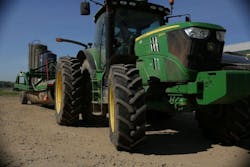The domestic ag tire market “is hot” right now, according to Ryan Loethen, president of CEAT Specialty Tires. And CEAT, he says, is capitalizing on that momentum by building its distribution base, ramping up its marketing efforts and rolling out new products in growing segments.
“Right now, we’re selling to importers, who are selling to wholesale channels and are pushing our products out to retailers,” says Loethen, who spent two decades at Michelin North America Inc. before joining CEAT this past January.
“We have good, strong dealers who have bought into the idea of providing value-priced tires at premium performance.
“I don’t want to overlap people,” including other tire manufacturers, when it comes to distribution, says Loethen.
“I think Michelin did a good job when they came to the (U.S. ag tire) market. They don’t put (their product) on every street corner and we want to be the same way. We want our dealers to make money. The farmer has to make money and so do our dealers.
“We don't want to put people on top of each other,” he explains. “They want to plug in a product they know they don’t have to worry about. The last thing a dealer wants to do is warranty work. They want to put in a quality product and make money. And they want to make the end user happy.”
Brand building
To continue to build its name recognition, CEAT is ramping up its marketing investment.
In August, the company announced a three-year sponsorship deal with the World Champions Road Alliance, which produces rodeo events throughout the United States.
CEAT also will sponsor the Women’s Rodeo World Championship, which will take place in November.
Amit Tolani, CEAT's chief executive, says rodeo “is a natural fit” for the company. “A large percentage of rodeo fans are farmers and ranchers.”
CEAT's marketing push also includes having a presence at farming industry shows.
“We held a contest last year during the Farm Progress Show that asked ‘How do you pronounce CEAT?’ We have to get the name out there and have to get our tires out to farms.”
Quality plus value
"Obviously, we are newer to the U.S." than some other ag tire manufacturers, says Loethen.
Before joining CEAT, he "looked at the (company's) product. I also looked at its performance and I looked at its price point and I said, 'This is a premium product that's priced like a value line.' We're offering a premium line at a price point the family farmer can afford."
Loethen speaks from experience. "I grew up on a farm. I know what it means to have to make decisions like , 'Do I buy this piece of equipment or do I put new tires on my tractor?' We're for the family farm - the little guy who wants that technology," but has to work within a leaner budget.
New products and supply
CEAT continues to introduce new products in high-tech, growing segments. Last year, the company rolled out an addition to its Torquemax line that contains very-high flexion (VF) technology. This was CEAT's first VF offering for the North American market.
"We decided it was time for a VF product," says Loethen.
Most of CEAT's tires are made in India. Loethen says the company has managed to steer clear of transpacific shipping complications.
"Are there lags? Of course, there are. The world is so interconnected. But we do a good job of (keeping up with) demand and we get our tires on the water. Would I like to have more? Absolutely. But we have good distributors and they're warehousing the product."
Loethen says "it's incumbent" on CEAT "to forecast accurately and make sure we have the right tires in the right places at the right time. Production is not an issue. We have excellent factories and excellent people in those factories.
"Everything we can get in the U.S. we can sell," he adds.



